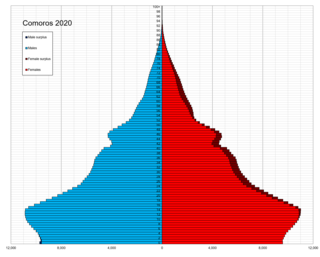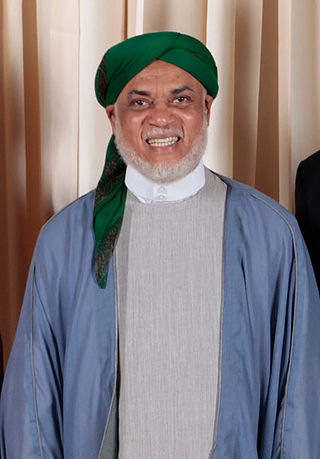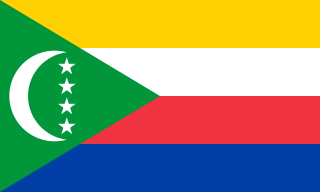
The Comorians inhabiting Grande Comore, Anjouan, and Mohéli share African-Arab origins. Islam is the dominant religion, and Quranic schools for children reinforce its influence. Although Islamic culture is firmly established throughout, a small minority are Christian.
In international law, a stateless person is someone who is "not considered as a national by any state under the operation of its law". Some stateless people are also refugees. However, not all refugees are stateless, and many people who are stateless have never crossed an international border. On November 12, 2018, the United Nations High Commissioner for Refugees stated there are about 12 million stateless people in the world.

Sayyid Ahmed Abdallah Mohamed Sambi is a Comorian Islamic leader and politician, and former President of Comoros. He is popularly known as 'Ayatollah'. After easily winning the 14 May 2006 presidential election with 58.02% of the national vote, Sambi was inaugurated as President of the Union of the Comoros on 26 May 2006. It was the first peaceful transfer of power in the history of the Comoros.
Human rights in Kuwait are a topic of significant concern. Most notably, Kuwait's handling of the stateless Bedoon crisis has come under substantial criticism from international human rights organisations and the United Nations. Kuwait has the largest number of stateless people in the entire region. Kuwait also faces significant criticism for the human rights violations against foreign nationals, women, and LGBT people. Although Kuwaiti law theoretically pledges to protect all human rights; the enforcement mechanisms designed to help protect human rights are very limited in Kuwait.

The President of Anjouan is the head of Anjouan, one of the three islands of the Union of Comoros. The position was firstly established in 1997 after the Declaration of independence of Anjouan. Secondly the position became President of the autonomous island of Anjouan following the adoption of the Union of Comoros Constitution of 2001.

Danish nationality law is governed by the Constitutional Act of the Realm of Denmark and the Consolidated Act of Danish Nationality . Danish nationality can be acquired in one of the following ways:
This page list topics related to Comoros.
The Bedoon or Bidoon, fully Bidoon jinsiya, are stateless people in several Middle Eastern countries, but particularly in Kuwait, where there is a large population of stateless people who lack access to many of the country's basic services. It is widely believed that the Bedoon issue in Kuwait is sectarian in nature.

Emirati nationality law governs citizenship eligibility in the United Arab Emirates (UAE). The law is primarily jus sanguinis. Foreigners may be naturalized and granted citizenship. Gulf Cooperation Council citizens are allowed to live in the UAE without restriction and have the right of freedom of movement. However, for a period of time, the UAE and Gulf countries banned Qatari citizens from living in the UAE and Gulf countries, with the exception of Qatari spouses.
Henley & Partners is an investment migration consultancy based in London. The company also advises governments on residence and citizenship-by-investment policy and works with them to develop and implement residence and citizenship programs. According to The Guardian, it "arguably invented the modern 'citizenship planning' industry". Led by Christian Kälin, the firm is, as of 2020, the world's largest investment migration consultancy.

Comoros–India relations are the international relations that exist between Comoros and India. The Embassy of India in Antananarivo, Madagascar is concurrently accredited to Comoros. India also maintains an Honorary Consulate General in Moroni. Comoros maintains an Honorary Consulate in New Delhi.
Said Ali Kemal was a Comorian politician. He was the son of Prince Saïd Ibrahim Ben Ali and the grandson of Sultan Said Ali bin Said Omar of Grande Comore.

Muhammad Bashar Kiwan, known as Bachar Kiwan, is a Syrian-French convicted felon, fraudster and international fugitive. He is sought by the authorities in the Comoros Islands for criminal convictions relating to money laundering, fraud, and embezzlement in connection with the Comoros passport sales scandal and in Kuwait for criminal convictions relating to various white collar crimes including money laundering, criminal fraud, forgery, bribery. He is a former businessman, having founded and invested in companies in the media and advertising industry operating in the Arab world, including Al-Waseet International Company. He previously held the positions of chairman of the Syrian Business Council in Kuwait, Honorary Consul of Comoros for Kuwait, and was a member of the Syrian-Iranian Business Council.

Comorian nationality law is regulated by the Constitution of the Comoros, as amended; the Comorian Nationality Code, and its revisions; and various international agreements to which the country is a signatory. These laws determine who is, or is eligible to be, a national of the Comoros. The legal means to acquire nationality, formal legal membership in a nation, differ from the domestic relationship of rights and obligations between a national and the nation, known as citizenship. Comorian nationality is typically obtained under the principle of jus soli, i.e. by birth in the Comoros, or jus sanguinis, born abroad to parents with Comorian nationality. It can be granted to persons with an affiliation to the country, or to a permanent resident who has lived in the country for a given period of time through naturalization. The country no longer allows for nationality to be acquired through investment.
Majd Bahjat Suleiman, also known as Majd Suleiman or Majid Suleiman, is a Dubai-based Syrian businessman and son of the former Syrian ambassador to Jordan and intelligence chief Bahjat Suleiman. He is the owner of Syria's largest media conglomerate, United Group (UG) which also operates under the trade name AWI Company and is affiliated with Al Waseet International.

The Comoros passport sales scandal is a corruption, public funds embezzlement, bribery, and money laundering scheme in connection with a citizenship by investment program launched by the government of the Comoros Islands. Proceeds from the program were intended to finance development in the country but were instead embezzled by the perpetrators of the scheme, which include Syrian fugitive businessman Bashar Kiwan and two former Comorian Presidents.

Comoro Gulf Holdings (CGH), sometimes referred to as Comoros Gulf Holding or Comoro Gulf Holding, was an investment company set up by Syrian businessmen Bachar Kiwan and Majd Suleiman that had worked closely with former Comorian president Ahmed Abdallah Mohamed Sambi, and "monopolized investment and development on the islands."
Mohamed Ali Soilihi is a Comorian politician from Grande Comore who served as Vice-President of Union of the Comoros for Ministry of Finance, Budget, Foreign Trade and Economy of Comoros. He served in the cabinet of Ikililou Dhoinine from May 2011 to May 2016.

Corruption in the Comoros follows the familiar patterns of state-based corruption, namely government officials abusing their political powers for private gain in the country of Comoros.










